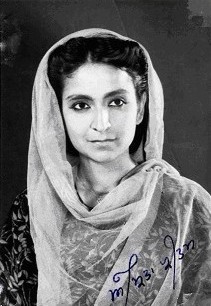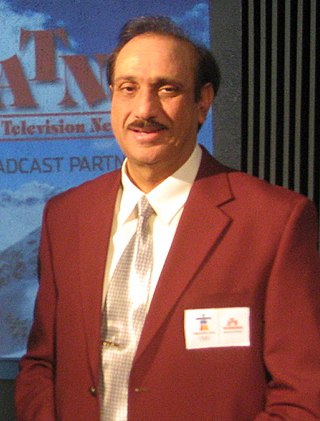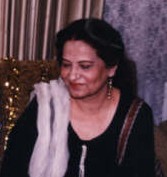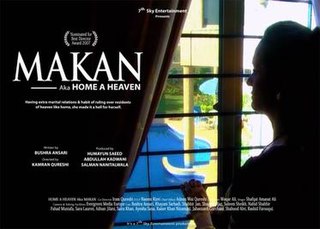Related Research Articles
Mehdi Hassan Khan known as Mehdi Hassan was a Pakistani ghazal singer and playback singer. Widely considered one of the greatest and most influential figures in the history of ghazal singing, Hassan is referred to as the "Shahenshah-e-Ghazal". Known for his "haunting" baritone voice, Hassan is credited with bringing ghazal singing to a worldwide audience. He is unique for his melodic patterns and maintaining integrity of the ragas in an innovative way.

Amrita Pritam was an Indian novelist, essayist and poet, who wrote in Punjabi and Hindi. A prominent figure in Punjabi literature, she is the recipient of the 1956 Sahitya Akademi Award. Her body of work comprised over 100 books of poetry, fiction, biographies, essays, a collection of Punjabi folk songs and an autobiography that were all translated into several Indian and foreign languages.
Hasan Abidi was a Pakistani journalist, writer, political activist and an Urdu language poet.
A shayar is a poet who composes sher or couplet in Urdu poetry. A shayar is someone who writes ghazals, nazms using the Urdu, Hindi & Bangla language.

Abdul Hayee, popularly known by his pen name (takhallus) Sahir Ludhianvi, was an Indian poet who wrote primarily in Urdu in addition to Hindi. He is regarded as one of the greatest film lyricist and poets of 20th century India.

Mustafa Zaidi was a Pakistani Urdu poet and a civil servant.

Fahmida Riaz was an Urdu writer, poet and activist from Pakistan. She authored many books, such as Godaavari, Khatt-e Marmuz, and Khana e Aab O Gil in addition to the first translation in rhyme of the Masnavi of Jalaluddin Rumi from Persian into Urdu. The author of more than 15 books of fiction and poetry, she remained at the center of controversies. When Badan Dareeda, her second collection of verses, appeared, she was accused of using erotic and sensual expressions in her work. The themes prevalent in her verse were, until then, considered taboo for women writers. She also translated the works of Shah Abdul Latif Bhitai and Shaikh Ayaz from Sindhi to Urdu. Fleeing General Zia-ul Haq's religious tyranny, Riaz sought refuge in India and spent seven years there.

Ashfaq Hussain Zaidi, PP, is an Urdu Pakistani poet and an author of more than 10 books of poetry and literary criticism. He is considered at least by one commentator to be an expert on the life and works of Urdu poets Faiz Ahmed Faiz, Ahmad Faraz and also on Progressive Writers Movement.

Ustad Amanat Ali Khan was a Pakistani classical vocalist from the Patiala gharana tradition of music and is widely regarded as one of the finest classical and ghazal singers of all time. Together with his younger brother, Ustad Bade Fateh Ali Khan, he formed a famed singing duo that garnered widespread popularity across the Indian subcontinent. For his contributions to classical music, Amanat Ali was honoured with the highest national literary award of Pakistan – the Pride of Performance – by the President of Pakistan in 1969. Khan was especially noted for khayal, thumri, and ghazal styles of singing and has been described as "the maestro of the Patiala gharana." He stands with singing icons like Mehdi Hassan and Ahmed Rushdi, having left behind a legacy of hundreds of classical and semi-classical songs.
Zehra Nigah is a prominent Urdu poet and scriptwriter from Pakistan. She is fondly known as 'Zehra Apa' in the nation. Among the pioneers of poetry by women, Nigah was one of the first Urdu women poets to make their mark in the male dominated field. Nigah's accomplishments especially shone in the domain of mushaira, as she is considered the first female poet to fully participate and make a visible mark in such events. Zehra is an occasional songwriter and scriptwriter too.
Kishwar Naheed is a feminist Urdu poet and writer from Pakistan. She has written several poetry books. She has also received awards including Sitara-e-Imtiaz for her literary contribution to Urdu literature.

Krishna Sobti was an Indian Hindi-language fiction writer and essayist. She won the Sahitya Akademi Award in 1980 for her novel Zindaginama and in 1996, was awarded the Sahitya Akademi Fellowship, the highest award of the Akademi. In 2017, she received the Jnanpith Award for her contribution to Indian literature.
Himayat Ali Shair was an Urdu poet, writer, film songwriter, actor and radio drama artist from Pakistan. He received the 2002 Pride of Performance Award for his literary services in Urdu literature from the president of Pakistan. He also received two Nigar Awards in 1962 and 1963 for 'Best Song Lyricist' for the Pakistani films "Aanchal" (1962) and "Daman" (1963).

Shabnam Shakeel was a Pakistani poet, writer, and academician. Shabnam spent her early life in Lahore, Pakistan, and received a master's degree in Urdu literature. During her career, she worked as a lecturer at several colleges in Pakistan. Her first book Tanqeedi Mazameen, was published in 1965. She won numerous awards, honours and titles for her contributions to Urdu literature including the prestigious presidents' Pride of Performance award in 2005.
Sabir Zafar is a leading poet and lyricist in Pakistan. He has written songs for many Pakistani films, singers such as Nazia Hasan, Sajjad Ali, Ali Azmat and his band Junoon, as well as many successful TV drama serials. He was awarded a Tamgha-e-Imtiaz by the Government of Pakistan in 2010.

Makan (Urdu: مكان is a Pakistani TV Drama Series, which was broadcast on GEO TV. The serial is directed by Kamran Qureshi, written by Bushra Ansari and produced by Humayun Saeed and Abdullah Kadwani's production house 7th Sky Entertainment. The story based on extramarital affairs, the dignity of family relations and has the essence of the realities of life.
Rukhsana Ahmad is a Pakistani writer of novels, short stories, poetry, plays, and a translator, who after marriage migrated to England for further studies and pursue a career in writing. She has campaigned for Asian writers, particularly women.
Zafar Iqbal is an Urdu poet based in Okara, Punjab, Pakistan in Arain family.

Umrao Jaan Ada is a Pakistani television series based on Mirza Hadi Ruswa's novel Umrao Jaan Ada. It is directed by Raana Sheikh and first aired on Geo Entertainment. Aamina Bano played the title role of Umrao Jaan. The supporting cast features actors Bushra Ansari, Faisal Qureshi, Imran Abbas, Humayun Saeed and Mehmood Aslam in prominent roles. Made with a heavy production budget, it is one of the expensive television series made in Pakistan. The series depicts the tawaif of Lucknow during the mid-nineteenth century. It was a pioneer portrayal of extramarital sex after Zia's era. Due to having several mujra performances as well, the series was termed as too bold at that time.
References
- ↑ InpaperMagazine, From (1 July 2013). "Column: Respectability has many forms: remembering Sara Shagufta By Kamran Asdar Ali". DAWN.COM. Retrieved 20 May 2022.
- 1 2 Kamran Asdar Ali (1 July 2013). "Column: Respectability has many forms: remembering Sara Shagufta". DAWN.COM. Retrieved 14 February 2018.
- ↑ Parekh, Rauf (27 April 2015). "Creativity and mental disorder: Urdu poets and writers who committed suicide". DAWN.COM. Retrieved 14 February 2018.
- 1 2 "सारा शगुफ़्ता : इंसान से पहले मौत ज़िंदा थी- Amarujala". Amar Ujala (in Hindi). 1 October 2017. Retrieved 14 February 2018.
- 1 2 3 4 5 Modi, Chintan Girish (16 July 2016). "LITERARY REVIEW: Still I Rise!". The Hindu. Retrieved 14 February 2018.
- ↑ Ahmad, R. (1991). We sinful women: Contemporary Urdu feminist poetry. London: The Women's Press.
- ↑ Daftuar, Swati (27 March 2015). "A life in defiance". The Hindu. Retrieved 14 February 2018.